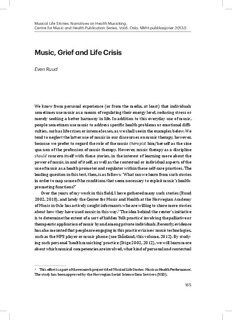| dc.description.abstract | We know from personal experience (or from the media, at least) that individuals sometimes use music as a means of regulating their energy level, reducing stress or merely seeking a better harmony in life. In addition to this everyday use of music, people sometimes use music to address specific health problems or emotional difficulties, such as life crises or intense losses, as we shall see in the examples below. We tend to neglect the latter use of music in our discourses on music therapy, however, because we prefer to regard the role of the music therapist him/herself as the sine qua non of the profession of music therapy. However, music therapy as a discipline should concern itself with these stories, in the interest of learning more about the power of music, in and of itself, as well as the contextual or individual aspects of the use of music as a health promoter and regulator within these self-care practices. The leading question in this text, then, is as follows: ‘What can we learn from such stories in order to map some of the conditions that seem necessary to exploit music’s healthpromoting functions?’
Over the years of my work in this field, I have gathered many such stories (Ruud 2002, 2010), and lately the Center for Music and Health at the Norwegian Academy of Music in Oslo has actively sought informants who are willing to share more stories about how they have used music in this way. The idea behind the center’s initiative is to determine the extent of a sort of hidden ‘folk practice’ involving the palliative or therapeutic application of music by and among private individuals. In this text, I will draw upon two particular subject interviews in which music is described as a self-help measure taken to address a situation of loss and grief. In one case, the subject mainly listened to music; in the other, the subject played precomposed classical music. I also want to direct the reader to the article by Vist and Bonde in this anthology for relevant theoretical references and discussion on subjects like grief and grieving, receptive music therapy and the Bonny Method of Music and Imagery in particular, as well as issues of narrativity. | nb_NO |
